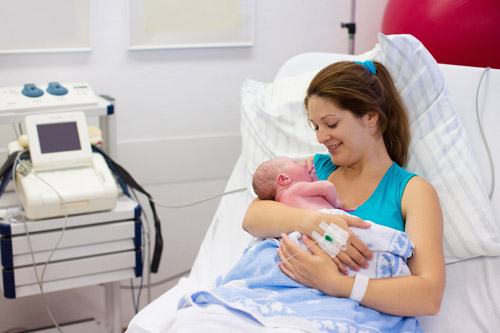The fifth round of the Innovating for Improvement programme is supporting 22 health care projects in the UK with the aim of improving health care delivery and/or the way people manage their own health care by testing and developing innovative ideas and approaches and putting them into practice.
The innovative project from North Bristol NHS Trust will roll out and evaluate the impact of structured simulation-based training in operative vaginal birth on the outcomes of mothers and their babies.
At present, over 80,000 women a year in the UK have an operative vaginal birth (a birth assisted using either a suction cup or forceps), but there is no evidence whether dedicated simulation training helps junior obstetric doctors learn the skills they need to perform these complex births.
This project, delivered with the support of the Royal College of Obstetricians and Gynaecologists, will systematically teach junior obstetric doctors these skills, and will evaluate the effect on woman and babies.
Over the course of the programme the team will develop its innovative idea and approach, put it into practice and gather evidence about how the innovation improves the quality of health care.
The team will be led by Dr Stephen O’Brien, under the supervision of Mr Dimitrios Siassakos.
Dr Stephen O’Brien, Clinical Research Fellow in Obstetrics & Gynaecology at North Bristol NHS Trust and the University of Bristol, said: "We are tremendously excited to be partnering with the Health Foundation to deliver a meaningful answer to an important question – how do we help women and babies having difficult, complex operative vaginal births using forceps or suction cups, have better outcomes, fewer problems and swifter recoveries.
"No-one has yet systematically delivered or tested a training programme that will give the doctors performing these challenging procedures the skills they need quickly and in a safe environment – with the support of the Health Foundation and the Royal College of Obstetricians and Gynaecologists, we will do so."
Sarah Henderson, Associate Director from the Health Foundation, said: "We are very excited to be working with such a high-calibre of teams, who all have great innovative ideas. As an organisation we are keen to support innovation at the frontline across all sectors of health and care services, and I am pleased that we will be able to support these ambitious teams to develop and test their ideas over the next year.
"Our aim is to promote the effectiveness and impact of the teams’ innovations and show how they have succeeded in improving the quality of health care, with the intention of these being widely adopted across the UK."
Dimitrios Siassakos, Consultant Senior Lecturer in Obstetrics at the University of Bristol and North Bristol NHS Trust, and National Simulation Advisor for the Royal College of Obstetricians and Gynaecologists (RCOG), said: "Some countries have given up on operative vaginal birth and have now to deal with high caesarean section rates, and with complications for mothers and babies when a difficult caesarean is performed instead of an easier operative vaginal birth. The UK is at the forefront of obstetric training.
"However, not all training is equal, and several training programmes have been ineffective or even harmful. It is time we implement only evidence-based training, and time we evaluate impact on care and outcomes with robust research. With the support of the Health Foundation and the RCOG we will do precisely that."
Professor Janice Rymer, Vice President for Education for the Royal College of Obstetricians and Gynaecologists, said: "With one in every eight women undergoing an operative vaginal birth in the UK, it is vital that obstetric trainees receive appropriate training to ensure the best possible outcomes for mothers and their babies.
"The RCOG is pleased to support this innovative simulation-based approach to training which we hope will provide our junior doctors with the skill-set and confidence they need to manage more complex births."
The programme will run for fifteen months and each project will receive up to £75,000 of funding to support the implementation and evaluation of the project.
